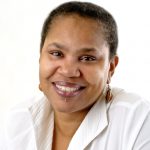
This Forum Update was provided by Celeste Â-Re, Recorded Sound Processing Technician, Library of Congress, National Audio-Visual Conservation Center.
In 2006 I stepped outside of my comfort zone. Transitioning careers, I completed graduate studies in Library and Information Science, trusting that I could transfer 10 years of project management experience in stagecraft and performance arts administration to the L/IS domain. When I received my M.S., digital library initiatives were in their infancy and I felt as if I were standing at the bleeding edge of the sector. Eight years later my trajectory into librarianship brought me to the Digital Library Federation Forum as an Underrepresented Groups Fellow, keenly aware of the diligence and grace required to navigate digital curation standards and practices in order to provide web-scale discovery services.
Following Bethany Nowviskie’s charge, I moved through the forum mindful of the question she posed during her opening keynote plenary and sat in conversation with presenters and participants at the DLF Forum annual meeting:
[I]s the expert/generalist or the local/global or the personal/collective dichotomy playing out here in a fruitful way, in a way likely to make a positive contribution at a critical moment for us all? Are we considering these levels of zoom consciously enough—and fluidly enough, and with respect for the people laboring in them?1
I began by speaking with Sasha Griffin after the From Zero to 60: Lessons Learned from Setting up Digital Initiatives in Small to Mid-sized Academic Institutions work session, we talked about her interest in mentoring, curriculum building, and archives administration. Griffin is currently the University Archivist/Special Collections Librarian at Denison University, working in a ‘Lone Arranger’ capacity as a solo archivist. Prior to her recent arrival to Denison she contributed toward the development of the Archival Leadership Institute (ALI) at Luther College.
“We’re all in the position of making order out of chaos. I really like having the challenge of making materials accessible using workflows and efficiencies and the responsibility of writing proposals and budget requests.” Through these processes Griffin has had an impact in shaping archival professional development; writing the ALI grant proposal with Rachel Vagts to create “one of the few”2 archival leadership training programs in the U.S.
My experience developing ALI was really a partnership with Rachel [Vagts]3. I came up with the idea but had no idea how to implement it; she was encouraging and provided direction. I gained project management experience from the point of conception to execution. Those skills – grant development, budget preparation, personnel coordination, and curriculum development – were something I wouldn’t have been able to learn at that level in any other way.
Griffin believes that collaborative approaches provide a means for practitioners unable to see themselves in positions as project directors to own, grow, collaborate, and create more leadership initiatives.
I wanted to catch up with Eugenia Kim, a former DLF Forum Underrepresented Groups fellow who participated as a presenter at this year’s annual meeting. I was curious to know if she had discovered answers bridging the question she reflected upon in her 2013 DLF Forum post, Quandary of the Library Cake – how can the L/IS domain successfully embody inclusion in its digital initiatives?
Kim is the quintessential Johanna Factotum – archivist, choreographer, and youth mentor. She is the Digital Archivist at the Iwasaki Library at Emerson College, as well as founder of Penumbra:RME, a transdisciplinary research, movement and collaboration hub for digital humanities and dance preservation.4 A self-identified jazz dance centrist, Kim is comfortable in both information technology and dance production domains; using choreographic process to demystify digital curation:
What has become liberating is the notion of organic movement. What are you inherently drawn towards rather than prescribed to do? Some digital initiatives prescribe strict metadata standards/schema and use the OAIS (Open Archival Information System) model. Meanwhile, pacesetters are off developing a completely new thing as everyone else adopts prescribed standards.
Regarding the question of how strategic planning can sustain inclusion and digital initiatives within L/IS institutions, Kim touches upon 5 areas:
- a work environment that fosters retention
- professional development
- networking mechanisms
- mentorship
- experience outside of the domain
“The key thing missing is mentorship.” Kim believes she was fortunate to have had good mentoring experiences. She credits Mark Puente (ARL) and Tanisha Jones (New York Public Library), “I got lucky, these people were outliers who were up to date with what’s going on AND kept an open mind.”
- Nowviskie, B. (October, 2014). Johannes Factotum & the Ends of Expertise. Opening keynote address presented at the fifteenth annual meeting of the Digital Library Federation Form, Atlanta. Retrieved from http://nowviskie.org/2014/johannes-factotum
- Skinner, K. & Krabbenhoeft, N. (2014). Training the 21st Century Library Leader: A Review of Library Leadership Training, 1998-2013 (Version 1.02). Atlanta, GA: Educopia Institute. Retrieved from http://metaarchive.org/public/publishing/Training_the_21st_Century_Library_Leader.pdf
- Rachel Vagts is the program director for the 2013-2015 iteration of the Archives Leadership Institute and is the director of Head of Special Collections & Archives at Berea College in Berea, Kentucky.
- Penumbra: RME. (n.d.).Retrieved from http://www.penumbrarme.org
